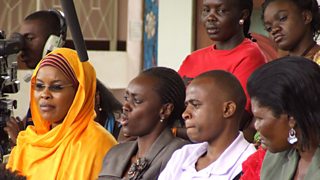
Sema Kenya audience
It’s been a significant few months for the “Any Questions” style TV and Radio show Sema Kenya. As Senior Production Manager Jackie Christie explains in her , after three years and over 80 episodes later, the team behind the show is handing over production to the Kenyan state broadcaster, KBC. For those of us working in Βι¶ΉΤΌΕΔ Media Action’s , this presents an opportunity to reflect the programme’s impact.
Researchers in London and Nairobi have been working since the creation of Sema Kenya not only to ensure that it remained relevant and appealing to audiences, but also to assess the programme’s impact on governance in Kenya.
Sema Kenya has had a clear purpose from its inception: to create a national conversation on democratic processes in Kenya, supporting accountability and increasing people’s knowledge of key governance issues, focusing on matters our audiences have said are most important to them, including unemployment, security, education and the high cost of living.
Our suggests that, through its locally driven programming and a format based on constructive moderated discussion, Sema Kenya was able to make a distinct contribution at election time. This was delivered by presenting a diversity of topics, views and dialogue at a time when a majority of Kenyan media maintained a narrow election focus aimed at “keeping the peace” by avoiding sensitive issues such as ethnicity and land - key topics perceived to have contributed to the post-election violence in 2008.
Improving knowledge
Our findings show media can have a constructive and meaningful role even in challenging contexts. However there were other key questions we wanted to answer, such as the extent to which Sema Kenya contributed to increasing audiences’ knowledge on key governance issues. The same study, which included a nationally representative survey of the population aged 15 and above, showed that the vast majority (93%) who listened or watched the programme regularly (at least every other week) thought that Sema Kenya improved their understanding of key governance issues. But we wanted to go further to determine if the increase in knowledge was associated with the programme or with, for example, an already existing interest in politics amongst those audiences or level of education.
To be able to answer this question, we created a scale of knowledge based on four main governance themes that the programme tackled: unemployment, security, implications of the new constitution and implementation of the devolution. We looked at whether people who watched or listened to the programme regularly were also showing higher levels of knowledge, even when taking into account their gender, level of education, purchasing power, interest in politics or group membership amongst other factors.
Our analysis showed that regular exposure to Sema Kenya was indeed associated with an increase in knowledge of governance, while controlling for other factors. This is an important finding because it shows Sema Kenya had successfully achieved its key objective of encouraging dialogue and improving knowledge on the democratic processes affecting Kenyans, a feat especially significant in the context of constitutional changes in the way Kenya was governed from 2010.
What about accountability?
The evidence so far suggests that Sema Kenya has contributed to facilitating a national conversation about the key issues affecting Kenyans and to improving knowledge on key governance issues. But what about accountability?
The majority (94%) of Sema Kenya’s regular audiences agree that the programme has played a role in holding government to account. Our findings so far suggest that it has done so by empowering audiences to ask questions and by putting leaders’ answers and promises on the record. Jackie Christie’s latest provides vivid and inspiring examples of the contribution of the show on accountability.
While we know the show’s impact on our regular audiences, how did the programme influence leaders? In Sema Kenya’s third season, the research team were busy interviewing decision-makers, government officials and local influencers. Getting access to these people isn’t an easy task but we wanted to better understand whether and how the programme may have played a role in driving demand for accountability, improving responsiveness, the transparency in decision-making and, ultimately, the service delivery to improve people’s lives.
Visit the Βι¶ΉΤΌΕΔ Media Action website for more or to keep up to date with the latest findings from Βι¶ΉΤΌΕΔ Media Action’s Research and Learning Team.
Related links
